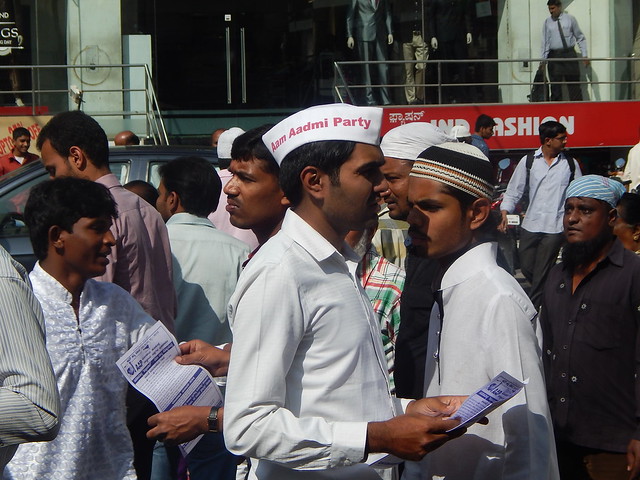By Gaurav Sharma,
New Delhi : A month after it vanquished the BJP and the Congress to take power in Delhi, the Aam Aadmi Party (AAP) is battling its worst internal crisis, causing widespread dismay in its rank and file.
AAP leaders admit they are eagerly awaiting the return of Chief Minister Arvind Kejriwal from Bengaluru, where he is undergoing naturopathy treatment for cough and high blood sugar, to put out the fires which are threatening to engulf India’s youngest political party.

For representational purpose (TCN file photo)
It was on February 14 that the AAP scored a stunning electoral victory, winning 67 of the 70 seats in Delhi’s assembly, leaving the Bharatiya Janata Party with just three. The Congress — India’s oldest party — was wiped out.
But within a fortnight, Kejriwal loyalists launched a war on two of the party’s best known leaders, Prashant Bhushan and Yogendra Yadav, accusing them of trying to oust the AAP chief.
At a hurriedly called meeting, the party’s National Executive voted to sack both from the Political Affairs Committee (PAC), the AAP’s highest decision making body.
A stunned Bhushan, a Supreme Court advocate and an AAP founder, and Yadav, a leading political pundit, denied the charges but insisted – in an oblique criticism of Kejriwal – that the AAP needed inner-party democracy.
Other AAP leaders plunged into the ugly internecine conflict, mostly ranged against the two. A group of AAP legislators called them “traitors”, saying they had actually wanted the party to lose in Delhi.
When another senior party leader, Mayank Gandhi, leaked out what really transpired at the meeting that ousted Bhushan and Yadav, he too came under attack.
Anjali Damania, who had unsuccessfully contested the Lok Sabha polls on AAP ticket, quit the party in disgust, after a conversation between a former AAP legislator and Kejriwal was released to the media, implying that the party convenor had approved “breaking up” of Congress MLAs. Damania said she had backed Kejriwal for values, “not horse-trading”.
If all this wasn’t enough, stings allegedly done on Kejriwal aide Sanjay Singh seemed to show the party had covertly tried to get Congress support for an AAP government in 2014 while publicly denouncing it.
In the process, its second-rung leaders and activists rue, the AAP is marking the very first month of its rule in Delhi amid gloom — instead of enjoying the moment.
An AAP leader admitted to IANS: “There was positivity after winning the 67 seats. That seems to have faded away.”
“This positivity could have been utilised in expanding the party,” he said, requesting anonymity.
Founded in 2012 on the strength of the anti-corruption movement of Gandhian activist Anna Hazare, the AAP stunned the nation by winning 28 of the 70 Delhi assembly seats in its very first poll outing in December 2013.
Kejriwal became chief minister in a hung house with the backing of the eight Congress legislators. But he quit after 49 days, inviting accusation that he was a “baghora” (deserter).
In the May 2014 Lok Sabha polls, the AAP won just four of the over 400 seats it ambitiously contested — all in Punjab. Barring a handful, all its candidates lost their security deposits.
But in another sensational turnaround, the AAP crushed the BJP in Delhi nine months later. It was the first defeat for Prime Minister Narendra Modi, who aggressively campaigned against Kejriwal.
Delhi’s Transport Minister Gopal Rai told IANS that the internal crisis notwithstanding, the AAP government was working hard to make a difference in the lives of the people.
“We have already delivered on our two biggest promises — free water and cheap power,” he said.
“This time we are going slow but steady as we are here to govern for five years, not 49 days,” he said. “We are here to make policies for long term.”
The government is working to regularize contract labour on its rolls. It has outlawed the sacking of any contract employee. A nine-member panel has been set up to implement the party’s other election promises.
The BJP is enjoying the AAP’s predicament, though the Congress has been more circumspect.
“The AAP is already split into two camps,” a BJP leader, R.P. Singh, told IANS. “This is no ideological war. It is a fight for power.”
Congress leader Ajay Maken, however, felt that a month was too short a time to judge Kejriwal or his government.
“Of these 30 days, Kejriwal was not in Delhi for 10 days,” he said, referring to his medical treatment in Bengaluru. “As for their crisis, it is an internal matter.”
But he added: “The public is watching them carefully.”
That is no consolation to the overwhelming bulk of AAP supporters and activists who had not expected what they are seeing within a month of the party’s victory.
One party member told IANS: “It was inevitable. The signs of cracks had started appearing right after the Lok Sabha polls. And it was certain that AAP’s success in Delhi would determine the future of the two camps.”
He added: “Yogendra Yadav has been successful in portraying himself as a victim but he is not.”
“What we see is disgusting,” said an AAP supporter. “We thought the AAP will be different from other parties.”
Related:
Who will Muslims in Delhi vote for?

